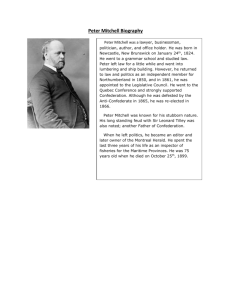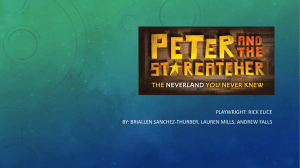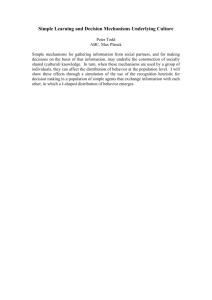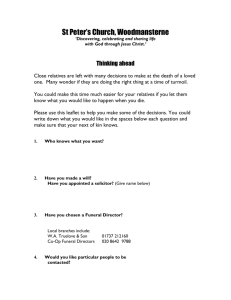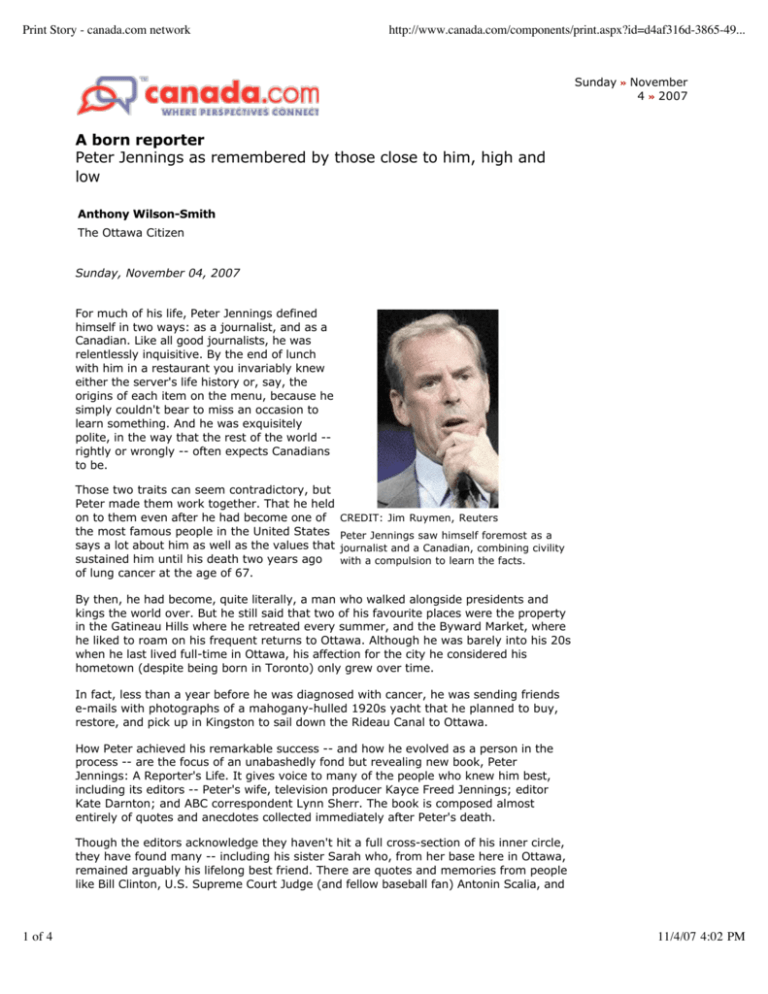
Print Story - canada.com network
http://www.canada.com/components/print.aspx?id=d4af316d-3865-49...
Sunday » November
4 » 2007
A born reporter
Peter Jennings as remembered by those close to him, high and
low
Anthony Wilson-Smith
The Ottawa Citizen
Sunday, November 04, 2007
For much of his life, Peter Jennings defined
himself in two ways: as a journalist, and as a
Canadian. Like all good journalists, he was
relentlessly inquisitive. By the end of lunch
with him in a restaurant you invariably knew
either the server's life history or, say, the
origins of each item on the menu, because he
simply couldn't bear to miss an occasion to
learn something. And he was exquisitely
polite, in the way that the rest of the world -rightly or wrongly -- often expects Canadians
to be.
Those two traits can seem contradictory, but
Peter made them work together. That he held
on to them even after he had become one of
the most famous people in the United States
says a lot about him as well as the values that
sustained him until his death two years ago
of lung cancer at the age of 67.
CREDIT: Jim Ruymen, Reuters
Peter Jennings saw himself foremost as a
journalist and a Canadian, combining civility
with a compulsion to learn the facts.
By then, he had become, quite literally, a man who walked alongside presidents and
kings the world over. But he still said that two of his favourite places were the property
in the Gatineau Hills where he retreated every summer, and the Byward Market, where
he liked to roam on his frequent returns to Ottawa. Although he was barely into his 20s
when he last lived full-time in Ottawa, his affection for the city he considered his
hometown (despite being born in Toronto) only grew over time.
In fact, less than a year before he was diagnosed with cancer, he was sending friends
e-mails with photographs of a mahogany-hulled 1920s yacht that he planned to buy,
restore, and pick up in Kingston to sail down the Rideau Canal to Ottawa.
How Peter achieved his remarkable success -- and how he evolved as a person in the
process -- are the focus of an unabashedly fond but revealing new book, Peter
Jennings: A Reporter's Life. It gives voice to many of the people who knew him best,
including its editors -- Peter's wife, television producer Kayce Freed Jennings; editor
Kate Darnton; and ABC correspondent Lynn Sherr. The book is composed almost
entirely of quotes and anecdotes collected immediately after Peter's death.
Though the editors acknowledge they haven't hit a full cross-section of his inner circle,
they have found many -- including his sister Sarah who, from her base here in Ottawa,
remained arguably his lifelong best friend. There are quotes and memories from people
like Bill Clinton, U.S. Supreme Court Judge (and fellow baseball fan) Antonin Scalia, and
1 of 4
11/4/07 4:02 PM
Print Story - canada.com network
http://www.canada.com/components/print.aspx?id=d4af316d-3865-49...
Condoleeza Rice, and his longtime friendly rivals Tom Brokaw and Dan Rather. And we
hear from his beloved children Christopher and Elizabeth (by his third wife, Kati
Marton) -- as well as one of the less-known but most important constants in his life:
Gretchen Babarovic, his longstanding personal assistant, gatekeeper, schedule
manager and trusted confidante.
Peter's childhood is inspiration to any parents who have despaired of their offspring. He
worshipped his father Charles (a famous CBC radio personality) and mother Elizabeth,
and through his life fretted about how they might judge him. But he was also, by his
admission, something of a hyperactive brat who bored easily, drifted indifferently
through school, and found it near impossible to maintain focus.
He was saved by his charm, good looks, intelligence and genuine interest in others -although even his famed ability as a quick learner had some bounds: Sarah recounts
how her brother was effectively invited to leave his expensive private school by the
headmaster, and got a job as a bank teller. "We always felt," recalls Sarah, "he'd either
be president of the bank or in jail because he couldn't count."
But Peter did many other things with a deceptive ease that contributed to his meteoric
rise: he was a nine-year-old CBC radio personality (to the dismay of his dad), he went
from being a 21-year-old radio reporter in Brockville to co-anchor of CTV's national news
within four years, and in 1964, at age 26, signed on with ABC as the youngest news
anchor in U.S. television history.
It was too fast a rise, and Peter understood in later years that this one "failure" was the
key to his ultimate success. When ABC moved him to a job as their Middle East
correspondent, it led to his coming of age as a journalist. To the surprise of many -who saw him as a pretty and earnest-looking face and great voice but more about style
than substance -- Peter proved to be a born reporter. His indefatigable energy,
breathtaking self-confidence, dizzying charm and the clout of working for a major
American network combined to give him access and influence that he used in the best
of ways. By the time he returned to the anchor chair in 1978 he had matured and
developed a sophisticated, first-hand knowledge of the world outside North America.
Peter was no saint, and never pretended to be. He married four times, finally finding his
match with Kayce. He was -- to use the famous description of Bruce Springsteen -- a
"notorious heterosexual." He suffered fools not at all, and his temper on occasion
trumped his usual courtesy when he faced obstacles in his reporting, or felt that
colleagues or friends had done less than their best. Friends became accustomed to
occasionally receiving calls beginning with the famously clipped voice saying "It's
Jennings." He would then swiftly move on to whatever information he had to impart.
You were expected to act immediately and with appropriate vigour, and if you didn't, to
have a good explanation as to why not.
All of those qualities are amply illustrated in this book. The three American editors knew
him well enough to understand Canada's emotional place in his heart. That said, it's a
shame that the book's chronology of key events in Peter's life omits the Order of
Canada he received shortly before his death -- although it's also true that the award
was given so shamefully late to the man who was arguably our most important goodwill
ambassador in the U.S. (That tardiness diminished some of the meaning it once would
have had for him.)
There is also a large section devoted to his decision to take out American citizenship in
2003 while keeping his Canadian citizenship. He was proud and delighted to become an
American -- but troubled by whether Canadians would think he was forsaking his roots.
(He phoned his Canadian friends to explain his reasoning.) As Gretchen Babarovic
recounts, there was another reason for his long delay in doing so: "His mother [who
died in 1991] really didn't want him to become an American citizen, and she had told
him so in no uncertain terms."
As Lynn Sherr notes in her introduction, the prospect of a biography of him "would
2 of 4
11/4/07 4:02 PM
Print Story - canada.com network
http://www.canada.com/components/print.aspx?id=d4af316d-3865-49...
have been anathema to Peter." (He often said he would never write his memoirs
because "that's something you do when you're retired -- and I have no intention of
retiring.") Despite the huge force of his own personality, he was troubled by and
disdainful of the modern trend toward first-person, personality-driven journalism. He
refused to say the word "we" on a newscast because, he explained, "Journalists
shouldn't include themselves in the story." (He added that was something he "learned
at the CBC.")
Regardless of whether Peter would have wanted or felt his life merited a biography,
there are several aspects he surely would have liked. One is the vast range of voices,
from the likes of Bill Clinton to Peter's longtime driver, as well as the children of friends.
That speaks to the way he engaged with people at all levels.
Peter would also have surely approved of the format of quotes and anecdotes that can
be read as stand-alones without intervention or editorializing by a third party. That's in
keeping with his view that his job was to help people to find the information they
needed to form their opinions -- not to tell them how to think.
Sarah Jennings in the book recalls "Pete" (only a very few people called him that ) being
asked whether he was able to be objective. His answer: "Probably that's impossible. But
it was very important to be fair."
If that sounds like a modest ambition, it's one that many nonetheless never achieve.
Peter managed that, and much more -- and so does this deceptively and appropriately
understated book (from which any profits go to the charitable Peter Jennings
Foundation).
Peter did Canadians -- and Americans -- proud. In all the right ways, this book does
the same for him.
Anthony Wilson-Smith, a former Maclean's editor, was one of Peter Jennings' many
friends.
BONUS REVIEWS
Life after Auschwitz:
How one man survived the notorious concentration camp to start a new life in Montreal.
And Nathan Englander's long awaited second book is a literary Rubik's Cube.
ottawacitizen.com/bookreviews
--The Book
Rockburn: the CPAC Interviews
By Ken Rockburn
Penumbra Press, $24.99
--WHAT WAS SAID
I remember walking down 67th Street with Peter ... and a panhandler stopped the two
of us. We each gave him money, but Peter stayed and talked to the man for about 10
minutes. He asked about his life, and he listened, and thereby he invested a damaged
soul with dignity.
--Ted Koppel
3 of 4
11/4/07 4:02 PM
Print Story - canada.com network
http://www.canada.com/components/print.aspx?id=d4af316d-3865-49...
I think the best journalists, be they in print or electronic media, understand that
someone signs their cheques, but that's not really their boss. I think the public
understood that Peter worked for them and that he was their representative, trying to
ferret out the truth.
-- Ken Auletta, author, magazine writer and Jennings' friend
The legacy he gave each of us who worked with him is to strive to be as caring, as
thorough, as passionate about our work as he was.
-- Barbara Walters
He helped hold the barbarians at the gates -- those who wanted to diminish the news,
or do it in a softer way. I think he stood for integrity.
-- Brian Ross, ABC's chief investigative correspondent
© The Ottawa Citizen 2007
Copyright © 2007 CanWest Interactive, a division of CanWest MediaWorks Publications, Inc.. All rights reserved.
4 of 4
11/4/07 4:02 PM


